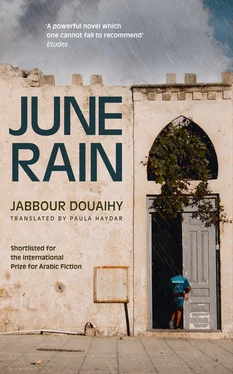Her period was two weeks late. She couldn’t ignore it any longer.
She went to see her mother. It was the first time she had gone out on the main road since her husband died. No, it was the second time in fact, because she took flowers one other time to the place in the almond grove where they had buried them so hastily, in one long row of little mounds of dirt. She brought him a bouquet of red roses and placed it beside his picture. Each little mound of dirt had a picture on top of it. His grave was the third one from the right. She stuck a stem of white lilies into the dirt.
Other Burj al-Hawa widows went out to participate in the elections. They carried posters of candidates and joined in the rallies. They were deliberately chosen as delegates inside the voting precincts; they argued and challenged and ululated and danced with joy and zeal when the election results were being announced.
Kamileh walked like a stranger, wrapped in black, trying to escape all the prying eyes. Evil’s hot wind scorched the roads and rumours were rampant.
‘Saeed al-Rami was killed.’
‘Where?’
‘He was reading the newspaper inside the pharmacy. They came in and killed him.’
‘Who killed him?’
‘Say hello to my brother if you see him there!’ That’s what one of them said just before shooting him in the head.
Everyone fled the scene and he remained there alone for two hours bleeding to death.
Kamileh told her mother what was going on with her. Her mother slapped her in the face for not listening to her from the start, the day they buried the dead. But her mother was not a woman who gave in. She tried to hang on to what was possible.
‘Go straight away, on your way home, hurry to Muntaha’s and have some coffee with her. Tell her about your cravings for dates and that your period is late. And tell her not to tell anyone. That’ll guarantee she’ll spread the word around to all the neighbours. She’s your friend. You know her better than I do.’
Kamileh changed the subject. ‘They killed Saeed al-Rami.’
Her mother didn’t show much dismay.
‘What’s going to happen, Mother?’
‘They’ll kill two in return.’
She turned towards Muntaha’s house. The streets were completely deserted and the tank that had been stationed in the middle of the square for the last month slowly circled around. The soldier who’d been outside its hatch ducked down inside and pulled the door shut. It moved along the road leading to Tripoli, preceded by a small military Jeep leading the way out. They heard on the radio the day before that the army wasn’t going to interfere in family feuds. The army commander was not taking sides. For a month the rumours had been flying, rumours of revenge and fear of what was to come. And all the while Kamileh hadn’t felt a thing.
She sat a bit at Muntaha’s but she didn’t dare tell her. She was afraid people would make fun of her if they thought she was imagining the pregnancy. Muntaha told her they had put up a barricade on the roof of the nuns’ school. They’d piled up sandbags that they watered every morning to make it harder for bullets to penetrate them. She told her that in his sermon after the gospel reading, Father Antonius said, ‘My children, pray many Our Fathers and Hail Marys so God will make us victorious over our enemies.’
She didn’t accept the truth until her belly began to show. Even then she said, ‘Maybe it’s bloated with water.’
‘Water?’
‘I don’t believe I am pregnant, Mother. I don’t believe it… How could that happen? What did you do to me?’
She was going to have a child. Her blood would bubble with joy and then just as quickly her stomach would wrench. She started getting scared. Every rumour she heard scared her, the sound of gunfire set her trembling. She was no longer alone.
‘You’re the object of scorn, Kamileh! You didn’t listen to me. Make them hold their tongues now if you can…’
‘What do I do, Mother?’
‘Don’t do anything. You have to eat well and get plenty of rest… Don’t pay them any attention.’
The news spread and along with it all kinds of talk, behind her back of course.
Then came the questions, heartless questions that lashed at her and gnawed at her. Where did she get it from? Fifteen years without children… her husband dies one minute and she gets pregnant the next, how’s that?
She preferred to hide inside the house, even avoiding the balcony. Only her mother came to visit her — her mother and Muntaha. And her sister Yasmeen whenever she managed to persuade her husband to let her chance it. Her mother brought her everything she needed.
‘Don’t go anywhere. I’ll make sure to get you everything you need.’
And Muntaha brought all the news, what people outside were saying, the neighbours in the area. Muntaha also had news of the fighting. She would come trembling with fear, and one day she came saying, ‘Kamileh, you won’t believe it. They are going to start sending wives back.’
‘Sending wives back?’
‘Yes, yes. I’m worried about my mother,’ Muntaha said. Her mother was an Al-Rami. ‘She’s been hearing things here in the quarter.’
‘Who’s saying it?’
‘I don’t know who, but they’re saying that she’s been relaying information to her family in the Upper Quarter.’
‘What information?’
‘I don’t know, Kamileh. They just say, “She’s been relaying information…”’
‘Does your mother visit her family’s quarter?’
‘Her sin was going there just once after the Burj al-Hawa incident, and they ganged up on her. Now, every time they run into her on the street or pass our house they curse the Rami family and curse their dead. My mother cries and says, “I am one of them, and so are my husband and children. Why are they saying those things to me?”
‘Where will my mother go if they kick her out of her house?’ Muntaha asked Kamileh, pounding her chest with her hand.
Kamileh didn’t answer. Muntaha let out a heavy sigh and raised her arms over her head in despair.
Her due date had come, but Eliyya was late. The army re-entered the town. A delegation consisting of members from both sides was formed and patrolled the streets to ensure the barricades had been lifted. The shooting stopped. The ambushes stopped. The same army commander who hadn’t taken sides was elected President of the Republic. It was what the Americans and Nasser wanted. People started talking about the law of ‘no winners and no losers’. The revolution was over and life went back to normal. Now there wouldn’t be anything to distract them from Kamileh anymore; no more dead and wounded. They would eat her alive.
Eliyya was ten days late. He was a big baby with a big head; he weighed a lot.
He was her life’s dream. A baby boy. Her mother taught her how to hold him, how to cradle his head in her arm. She stayed cooped up with her an entire month, training her in everything she knew. Kamileh’s mother was so wrapped up in worrying about the baby’s health that she didn’t have time to express her utter joy over him. She developed a severe lung infection and Eliyya hadn’t yet succeeded in calling her ‘Taita’ when they took her to the hospital and asked for a priest.
Kamileh had all the necessary equipment — nappies, clothes and even shoes. She had no need to go shopping. She washed his clothes for him and hung them to dry on the balcony — actually on a washing line she put up inside the house.
She was not going to show him in public.
In spite of all that, she was scorched by gossip. They’d all become experts on pregnancy and the lunar month. They made all kinds of calculations, salivating as they did. They besieged her with their calculations, which verified all their original suspicions.
Читать дальше












